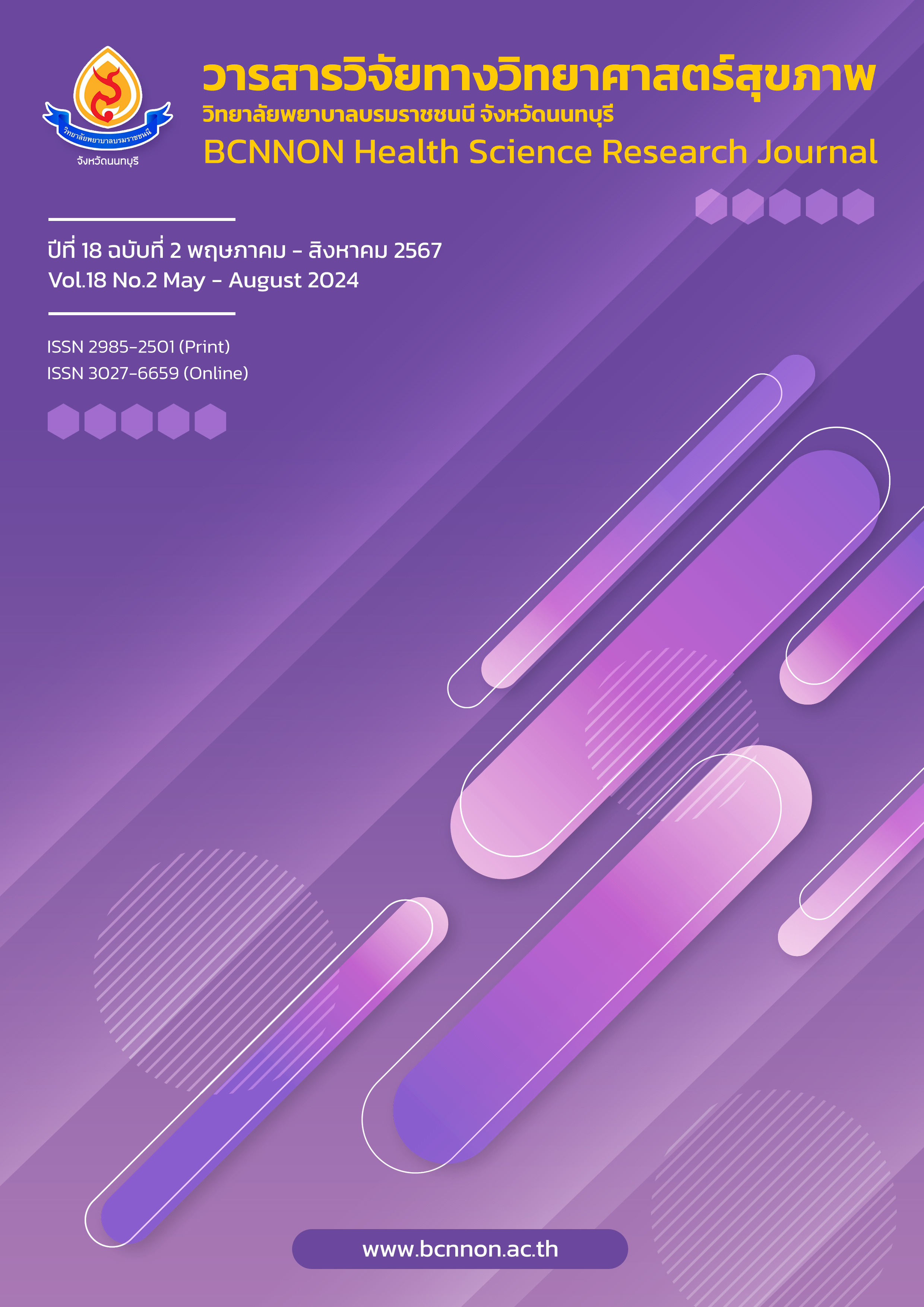ปัจจัยที่มีอิทธิพลต่อความรอบรู้ด้านสุขภาพมารดาของสตรีตั้งครรภ์วัยรุ่น
Main Article Content
บทคัดย่อ
บทนำ : การตั้งครรภ์วัยรุ่นเป็นกลุ่มที่มีโอกาสเกิดภาวะแทรกซ้อนทั้งร่างกายและจิตสังคม หากสตรีตั้งครรภ์กลุ่มนี้มีความรอบรู้ด้านสุขภาพมารดาจะสามารถเข้าถึง และเข้าใจข้อมูลด้านสุขภาพ ส่งผลให้มีพฤติกรรมสุขภาพและผลลัพธ์การตั้งครรภ์ที่ดี
วัตถุประสงค์การวิจัย : เพื่อศึกษาปัจจัยที่มีอิทธิพลต่อความรอบรู้ด้านสุขภาพมารดาของสตรีตั้งครรภ์วัยรุ่น
วิธีดำเนินการวิจัย : การวิจัยเชิงทำนายแบบตัดขวาง ตัวอย่าง ได้แก่ สตรีตั้งครรภ์วัยรุ่น อายุ 10-19 ปี จำนวน 98 ราย วิธีการเลือกตัวอย่างตามเกณฑ์การคัดเข้า เครื่องมือที่ในการวิจัย ได้แก่ แบบสอบถามข้อมูลส่วนบุคคล แบบสอบถามการสนับสนุนทางสังคม แบบสอบถามความรอบรู้ด้านสุขภาพมารดา และใช้สถิติการวิเคราะห์ถดถอยเชิงเส้นแบบพหุคูณ
ผลการวิจัย : ระดับการศึกษา รายได้ครอบครัว การสนับสนุนทางสังคม จำนวนครั้งของการฝากครรภ์ และจำนวนครั้งของการได้รับคำแนะนำด้านสุขภาพรายกลุ่มในระยะตั้งครรภ์สามารถอธิบายความผันแปรของความรอบรู้ด้านสุขภาพมารดาได้ร้อยละ 51 (R2=.510, F=19.120, p<.001) โดยปัจจัยที่สามารถทำนายความรู้ด้านสุขภาพมารดา ได้แก่ รายได้ครอบครัว การสนับสนุนทางสังคม จำนวนครั้งของการฝากครรภ์ และจำนวนครั้งของการได้รับคำแนะนำด้านสุขภาพรายกลุ่มในระยะตั้งครรภ์
สรุปผล : การส่งเสริมความรอบรู้ด้านสุขภาพมารดานั้น ขึ้นอยู่กับการได้รับข้อมูลด้านสุขภาพที่สำคัญเฉพาะตน เวลาในการได้รับข้อมูลด้านสุขภาพที่เพียงพอ และการได้รับการสนับสนุนทางสังคมที่ดีซึ่งช่วยให้สตรีตั้งครรภ์วัยรุ่นมีความรอบรู้ด้านสุขภาพที่เพิ่มขึ้น สามารถดูแลสุขภาพตนเองและทารกได้
Downloads
Article Details

อนุญาตภายใต้เงื่อนไข Creative Commons Attribution-NonCommercial-NoDerivatives 4.0 International License.
บทความที่ได้รับการตีพิมพ์เป็นลิขสิทธิ์ของวิทยาลัยพยาบาลบรมราชชนนี จังหวัดนนทบุรี
ข้อความที่ปรากฏในบทความแต่ละเรื่องในวารสารวิชาการเล่มนี้เป็นความคิดเห็นส่วนตัวของผู้เขียนแต่ละท่านไม่เกี่ยวข้องกับวิทยาลัยพยาบาลบรมราชชนนี จังหวัดนนทบุรี และคณาจารย์ท่านอื่น ในวิทยาลัยฯ แต่อย่างใด ความรับผิดชอบองค์ประกอบทั้งหมดของบทความแต่ละเรื่องเป็นของผู้เขียนแต่ละท่าน หากมีความผิดพลาดใด ๆ ผู้เขียนแต่ละท่านจะรับผิดชอบบทความของตนเองแต่ผู้เดียว
เอกสารอ้างอิง
World Health Organization; 2023 [cited 2023 Jun 10]. Available from: https://www.who.int/news-room/fact-sheets/detail/adolescent-pregnancy.
Krua-chottikul S. Nursing strategy for promoting maternal tasks adaptation of teenage pregnancy. Kuakarun Journal of Nursing. 2014;1:7-16.
Chaimayo N, Chareonsanti J, Sriarporn P. Factors related to prenatal care among adolescent pregnants. Journal of Nursing and Health Care. 2016;4:106-14.
Lertsakornsiri M. The life assets and health promotion behavior in teenage pregnancy. Naresuan University Journal: Science and Technology. 2016;1:13-23.
Jaideechareon B. Health promoting behaviors and factors related to health behaviors of teenage pregnant women. [Dissertation M.S.]. Bangkok: Rangsit University; 2012.
Endres LK, Sharp LK, Haney E, Dooley SL. Health literacy and pregnancy preparedness in pregestational diabetes. Diabetes Care. 2004;2:331-34.
Lee JY, Murry N, Ko J, Kim TM. Exploring the relationship between maternal health literacy, parenting self-efficacy, and early parenting practices among low-income mothers with infants. J Health Care Poor Underserved. 2018;4:1455-71.
Renkert S, Nutbeam D. Opportunities to improve maternal health literacy through antenatal education: an exploratory study. Health Promotion International. 2001;4:381-8.
Kohan S, Ghasemi S, Dodangeh M. Associations between maternal health literacy and prenatal care and pregnancy outcome. Iranian Journal of Nursing and Midwifery Research Autumn. 2007;4:146-52.
Nutbeam D. Health literacy as a public health goal: a challenge for contemporary health education and communication strategies into the 21st century. Health Promotion International. 2008;3:259–67.
Nutbeam D. Defining, measuring and improving health literacy. Health Evaluation and Promotion. 2015;4:450-6.
Khorasani CE, Peyman N, Esmaily H. Measuring maternal health literacy in pregnant women referred to the healthcare centers of Mashhad, Iran, in 2015. Journal of Midwifery and Reproductive Health. 2018;1:1157-62.
Sorensen K, Van den Broucke S, Brand H. Fullam J, Doyle G, Pelikan J, Slonszka Z. Health literacy and public health: A systematic review and integration of definitions and models. BMC Public Health. 2012;1.
Maharlouei N. The importance of social support during pregnancy. Women's Health Bull. 2016;3.
Waraphok S, Ratinthorn A, Limruangrong P. Factors influencing maternal health literacy in pregnant women. Journal of Thailand Nursing and Midwifery Council. 2022;35:86-98.
Mojoyinola JK. Influence of maternal health literacy on healthy pregnancy and pregnancy outcomes of women attending public hospitals in Ibadan, Oyo State. Nigeria. Indexed African Journals Online. 2011;5:28-39.
Gasornboonnak P. The factors influencing health-promoting lifestyle amongst Primigravidarum adolescents in Nakhon Pathom province. [dissertation M.S.]. Nakhon Pathom: Christian University; 2011.
Paasche-Orlow MK, Wolf MS. The causal pathways linking health literacy to health outcomes. American Journal of Health Behavior.2007;31.
Bennett I, Switzer J, Aguirre A, Evans K, Barg F. ‘Breaking it down’: Patient-clinician communication and prenatal care among African American women of low and higher literacy. Annals of Family Medicine. 2006;4:334-40.
Safaie ZS, Rahebi MS, Haghjou NMS, Leili KE. The relationship between maternal health literacy and pregnancy outcome in Postnatal wards. Journal Biochem Tech. 2018;2:120-7.
Naigaga MD, Guttersrud O, Pettersen KS. Measuring maternal health literacy in adolescents attending antenatal care in a developing country - the impact of selected demographic characteristics. Journal of Clinical Nursing. 2015;24:2402-9.
Guttersrud O, Naigiga MD, Pettersen KS. Measuring maternal health literacy in adolescents attending antenatal care in Uganda: Exploring the dimensionality of the health literacy concept studying a composite scale. Journal of Nursing Measurement. 2015;23:50-66.


